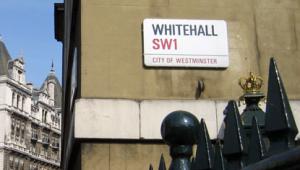By Tash Shifrin
10 September 2009
The Treasury has given Whitehall departments until the end of the month to provide details of back-office costs.
Chancellor Alistair Darling and Conservative leader David Cameron traded blows over future public spending plans in the run-up to the Pre-Budget Report in November. The pair gave rival speeches on September 8 – although both shied away from setting out where cuts would fall.
Their addresses followed comments by Chief Secretary to the Treasury Liam Byrne, who pledged that the PBR would provide ‘more detail about how we will halve the deficit over four years and protect those public services which we think are key to helping people’.
But a letter to permanent secretaries from the Treasury’s managing director of public services and growth, Andrew Hudson, and David Bell, who chairs Whitehall’s corporate functions board, revealed the need to gather reliable spending data before the PBR.
It said central departments, agencies and quangos that employ more than 250 staff must provide cost benchmarking data – on finance, human resources, procurement, IT and estates – by September 30. There had been ‘good progress’ collecting initial information required as part of the Operational Efficiency Programme.
But, the letter added, they were ‘keen to improve the quality and consistency of this data’ in advance of the PBR.
In his Callaghan Lecture in Cardiff, Darling signalled a shift away from the government’s stance as the defenders of public spending against Tory cuts.
‘Public spending is not a goal in itself,’ he said. ‘The first priority has to be to look for areas where we can achieve greater efficiency... Second, on top of doing more for less money, we have to step up our efforts to do things better.’ The government would make ‘tough choices’, Darling pledged.
Cameron said he would look at ‘areas of massive government expenditure’ for potential savings. ‘Public sector pay, gold-plated pensions, big procurement projects – whole swathes of state activity can no longer be sacrosanct.’
The Conservative leader attacked what he called ‘reckless’ government plans to increase public spending by £30bn between 2009/10 and 2010/11. Instead, cuts should begin in April, the Tories argue.
But Robert Chote, director of the Institute for Fiscal Studies noted: ‘Two-thirds of the increase in spending next year can be accounted for by rising social security costs... and increasing central government interest payments.’ Neither is straightforward to reduce in the short term, he said.
Professor Colin Talbot of Manchester University Business School told Public Finance that both parties had failed to be specific about their spending plans and when they intended to reduce the public sector deficit.
10 September 2009
The Treasury has given Whitehall departments until the end of the month to provide details of back-office costs.
Chancellor Alistair Darling and Conservative leader David Cameron traded blows over future public spending plans in the run-up to the Pre-Budget Report in November. The pair gave rival speeches on September 8 – although both shied away from setting out where cuts would fall.
Their addresses followed comments by Chief Secretary to the Treasury Liam Byrne, who pledged that the PBR would provide ‘more detail about how we will halve the deficit over four years and protect those public services which we think are key to helping people’.
But a letter to permanent secretaries from the Treasury’s managing director of public services and growth, Andrew Hudson, and David Bell, who chairs Whitehall’s corporate functions board, revealed the need to gather reliable spending data before the PBR.
It said central departments, agencies and quangos that employ more than 250 staff must provide cost benchmarking data – on finance, human resources, procurement, IT and estates – by September 30. There had been ‘good progress’ collecting initial information required as part of the Operational Efficiency Programme.
But, the letter added, they were ‘keen to improve the quality and consistency of this data’ in advance of the PBR.
In his Callaghan Lecture in Cardiff, Darling signalled a shift away from the government’s stance as the defenders of public spending against Tory cuts.
‘Public spending is not a goal in itself,’ he said. ‘The first priority has to be to look for areas where we can achieve greater efficiency... Second, on top of doing more for less money, we have to step up our efforts to do things better.’ The government would make ‘tough choices’, Darling pledged.
Cameron said he would look at ‘areas of massive government expenditure’ for potential savings. ‘Public sector pay, gold-plated pensions, big procurement projects – whole swathes of state activity can no longer be sacrosanct.’
The Conservative leader attacked what he called ‘reckless’ government plans to increase public spending by £30bn between 2009/10 and 2010/11. Instead, cuts should begin in April, the Tories argue.
But Robert Chote, director of the Institute for Fiscal Studies noted: ‘Two-thirds of the increase in spending next year can be accounted for by rising social security costs... and increasing central government interest payments.’ Neither is straightforward to reduce in the short term, he said.
Professor Colin Talbot of Manchester University Business School told Public Finance that both parties had failed to be specific about their spending plans and when they intended to reduce the public sector deficit.




















